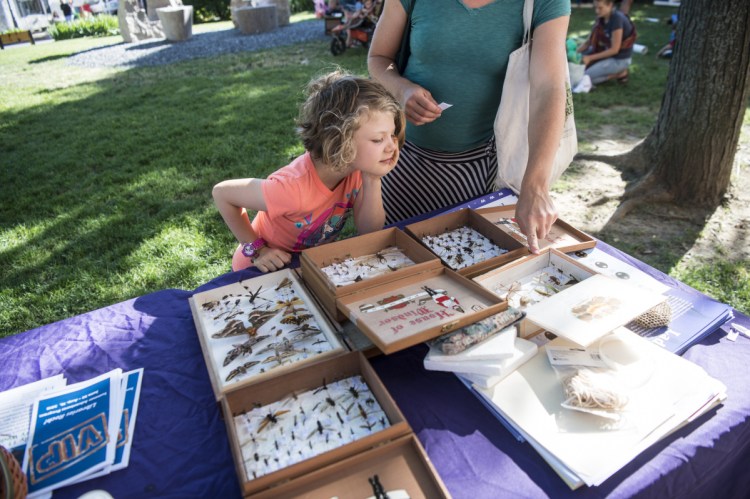WATERVILLE — A new initiative from a state program is not only helping kids become more interested in the food they eat, but also educating low-incomes families about how to take advantage of the farmers’ markets in their communities.
Maine SNAP-Ed’s new kids club is setting up shop for two hours every Thursday in Castonguay Square near the Waterville Farmers Market on Common Street to introduce new foods and flavors to children. Each week, from 4 to 6 p.m., children can visit the purple booth to participate in activities such as planting herbs and vegetables, which earns them a wooden token worth $3 that they can use to buy something at the market.
“Most of the farmers have at least one item that’s worth three dollars so that the kids can buy something,” said Emily Knipp, who works as a registered dietitian at MaineGeneral Medical Center with Healthy Northern Kennebec, a nonprofit based in Waterville that works with community and government agencies to improve public health.
In this case, Healthy Northern Kennebec is working with Maine SNAP-Ed, or Supplemental Nutrition Assistance Program-Education, to help inform individuals and families who are eligible for SNAP benefits of the healthy food options they can choose with their limited budget.
At the farmers’ market, Knipp said, shoppers who have SNAP or EBT benefits can double their purchasing power through the Harvest Bucks program. For each dollar in SNAP or EBT they spend at a farmers’ market, they get $1 from Maine Harvest Bucks to spend at the market.
“It’s essentially doubling your money and spending it all locally, which is really cool,” Knipp said.
The benefits of the program are not widely known, Knipp said, so the SNAP-Ed kid’s club is an attempt to spread the word and attract more families to the market.
During their first two weeks at the market, Knipp showed children how to plant mint, basil and other herbs in a planter box provided by Edible Main Street, a program created by the Center for an Ecology-based Economy, and the following week picked some of those herbs to make cucumber-and-mint and raspberry-and-basil flavored water.
This week, Knipp made a summer squash salad with zucchini, squash, dill and garlic scapes, all of which came from vendors at the market, for the children to try.

Emily Knapp, registered dietitian and SNAP-Ed coordinator, explains how the Maine SNAP-Ed kids club works while handing out wooden coins to Haley Carmichael and her daughter Malia, 6, on Thursday. The tokens can be used as currency at the Waterville Farmers Market on Common Street.
Additionally, entomologist Dana Michaud was on hand with cases full of different kinds of bugs to teach children how insects play a role in the growth of produce. In his cases he displayed wasps, both stinging and nonstinging; moths; bees; and flies.
“This is the bee I was talking about,” Michaud told Knipp, pulling out a small insect to show her. “This one pollinates your squash. It has the little brush underneath that grabs the pollen, and then it goes to the next plant. You have your zucchini today thanks to them.”
Michaud said he thinks the average person knows little about pollination.
“Anything that produces a seed had to be pollinated. Everything is tied together,” he said. “I’m amazed at how little people know about what feeds them. They think fruits and vegetables just pop out of the ground. That’s not how it works.”
Knipp plans to have more activities each week at the Waterville market until the end of August. Families in Skowhegan and Belfast also can find the kids club booth at their local markets, Knipp said.
Emily Higginbotham — 861-9239
ehigginbotham@centralmaine.com
Send questions/comments to the editors.




Success. Please wait for the page to reload. If the page does not reload within 5 seconds, please refresh the page.
Enter your email and password to access comments.
Hi, to comment on stories you must . This profile is in addition to your subscription and website login.
Already have a commenting profile? .
Invalid username/password.
Please check your email to confirm and complete your registration.
Only subscribers are eligible to post comments. Please subscribe or login first for digital access. Here’s why.
Use the form below to reset your password. When you've submitted your account email, we will send an email with a reset code.